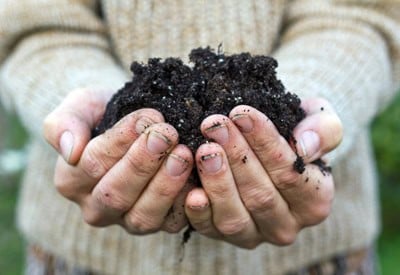We were fortunate to have had a middle school teacher (when middle school was still called “junior high”) who when teaching American history gave a lot of attention to the the dust bowl years of the 1930s. This fine instructor — if only we could remember his name! — not only discussed the destruction of farmland, the migration of displaced farmers from Texas, Oklahoma, and other states, and the huge black clouds that rolled into cities as far away as St. Louis, but the causes of the disaster; not just drought but the wrong-headed, unsustainable farming practices that turned once verdant farm and pasture land into what today would be called an environmental disaster area.
We lived in a farm state. Our teacher defined our soil as a resource and a valuable one. It was the thing that grew our food and powered our economy. It was easy to forget the value of dirt as we went through our lives. Our teacher made sure we knew just how valuable it was.
A bevy of recent news pieces on the U.S. Geological Survey project (PDF) begun in 2001 that’s taken soil samples from places across the county in an effort to catalog and understand the very ground beneath our feet has brought new attention to our soils. The actual digging began in 2007 and went on for three years. One place was sampled in every 600 square miles of land. Three samples were taken at each spot, beginning at the surface and going to a depth of three feet. While sampling a place in 600 square miles doesn’t seem so comprehensive, it resulted in 5,000 samples and the most comprehensive look at the dirt beneath our feet ever attempted.
While the article tends to trivialize the study and the uses for its results — check the mud on that murder suspect’s boot! — it also points out its uses in better farming techniques, measuring the effects of drought and climate change, and regional difference in soil composition in regard to mineral and chemical content, as well as the organisms that bring our soil to life. The article tells of a professor of environmental chemistry in Virginia who has used the studies to compare organic carbon and nitrogen levels, critical to crop growth, of various soils. Another researcher is using the data to study acid rain’s effect on forests in Pennsylvania. The list goes on.
We’ve often addressed the importance of soil to the organic gardener at Planet Natural. It’s the key to everything when growing — successful germination, vigorous growth, great harvests, weed, pest, and disease control. These immediate gains depend on things that aren’t necessarily visible in themselves, like nutrient composition and water conduction and retention. Once we’ve established great soil in our gardens, once we’ve learned to maintain it, everything else comes naturally.
While we gardeners know the importance of soil, not everyone else does. Like water, we tend to take it for granted. That often leads to its degradation. More knowledge of our soils and their value will aid in their preservation and restoration. We must realize that the soil that we stand on, build on and grow things in is alive. We must understand the role soil plays in water conservation. We must realize how easy it is to lose (PDF) and the costs when we do. We need to remember that ultimately it’s the source of the food we eat.
When we spray pesticides and herbicides on our yards, our parks, and our farmlands, we degrade water, air, and soil. The immense use of chemical fertilizers to keep farmlands productive is like keeping a patient alive on life support. Soil with its microbes (PDF) and soil enzymes must be able to sustain itself without our adding the chemicals that plants need to produce harvests. Let’s make it our cause to treat soil everywhere — on our farms, in our forests and grasslands, in our yards and public spaces — as we do it in our gardens. Let’s keep it healthy, naturally. Let’s remember it’s one of our most important resources, along with water and the air we breathe, and treat it accordingly, with respect. The generations to come, our children, their children and grandchildren, will thank us.












